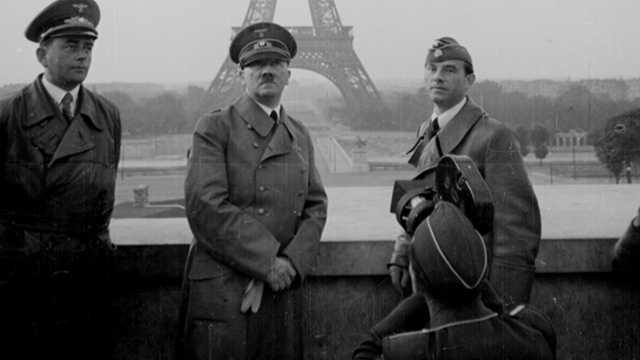In 1940, during World War II, the German invasion of Paris marked a significant turning point in the conflict. The invasion was a major military campaign undertaken by the German forces, resulting in the fall of the French capital and the occupation of France by Nazi Germany. This event had far-reaching consequences for both France and the rest of Europe.
The invasion began on May 10, 1940, when German forces launched a massive offensive against France, using a combination of armored divisions, air superiority, and rapid maneuvering tactics known as Blitzkrieg. The German military, under the command of General Heinz Guderian, swiftly advanced through the Ardennes Forest, a region believed to be impenetrable by large mechanized armies. This unexpected maneuver caught the French off guard and led to the collapse of their defenses.
As German forces closed in on Paris, panic spread throughout the French capital. The government declared a state of emergency, and many citizens fled the city in fear. On June 14, 1940, the German army entered Paris, meeting minimal resistance from the exhausted French troops. The fall of Paris marked a symbolic victory for Adolf Hitler and the Nazi regime, as they had long sought to avenge the humiliation of Germany’s defeat in World War I.
The occupation of Paris by the Germans brought about a dramatic shift in the city’s atmosphere. German soldiers patrolled the streets, and the French people experienced the heavy hand of Nazi rule. The occupiers imposed strict regulations, curfews, and censorship, suppressing any form of dissent. Parisian landmarks, such as the Eiffel Tower and the Louvre Museum, were heavily guarded or closed to the public.
Despite the occupation, a spirit of resistance emerged among the French people. Underground networks, such as the French Resistance, organized acts of sabotage, espionage, and rescue operations to undermine the German presence. Artists, writers, and intellectuals continued to produce clandestine works that challenged Nazi ideology and kept the flame of French culture alive.
The German occupation of Paris lasted until August 25, 1944, when Allied forces, including French resistance fighters, liberated the city. The liberation of Paris was a moment of great celebration and relief for the French people, symbolizing the end of German control and the restoration of French sovereignty.
The German invasion of Paris in 1940 remains a significant event in history, representing the triumph of Nazi Germany and the subsequent resistance and liberation. It showcased the effectiveness of Blitzkrieg tactics and exposed the vulnerabilities of the French military. The occupation of Paris and the resistance movement that followed became powerful symbols of courage and resilience, highlighting the determination of the French people to regain their freedom. Today, the events of 1940 serve as a reminder of the horrors of war and the enduring human spirit in the face of adversity.
newshub



Recent Comments